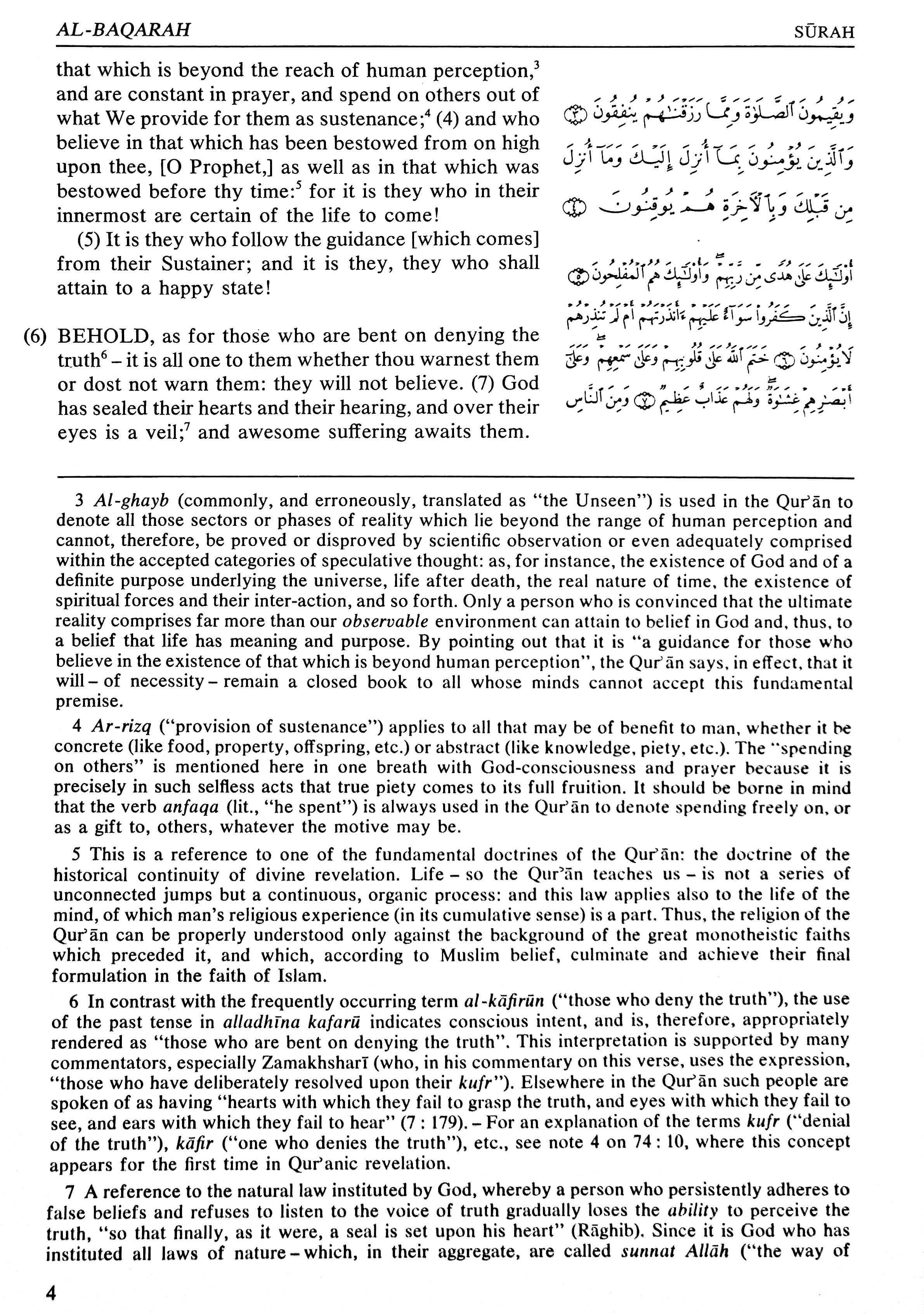Muhammad Asad, The Message of the Qur’ān; Translated and Explained by Muhammad Asad (1980)
that which is beyond the reach of human perception,3 and are constant in prayer, and spend on others out of what We provide for them as sustenance;4 (4) and who believe in that which has been bestowed from on high upon thee, [O Prophet,] as well as in that which was bestowed before thy time:5 for it is they who in their innermost are certain of the life to come!
(5) It is they who follow the guidance [which comes] from their Sustainer; and it is they, they who shall attain to a happy state!
(6) Behold, as for those who are bent on denying the truth 6 - it is all one to them whether thou warnest them or dost not warn them: they will not believe. (7) God has sealed their hearts and their hearing, and over their eyes is a veil;7 and awesome suffering awaits them.
3 Al-ghayb (commonly, and erroneously, translated as “the Unseen”) is used in the Qurʾān to denote all those sectors or phases of reality which lie beyond the range of human perception and cannot, therefore, be proved or disproved by scientific observation or even adequately comprised within the accepted categories of speculative thought: as, for instance, the existence of God and of a definite purpose underlying the universe, life after death, the real nature of time, the existence of spiritual forces and their inter-action, and so forth. Only a person who is convinced that the ultimate reality comprises far more than our observable environment can attain to belief in God and, thus, to a belief that life has meaning and purpose. By pointing out that it is “a guidance for those who believe in the existence of that which is beyond human perception”, the Qurʾān says, in effect, that it will – of necessity – remain a closed book to all whose minds cannot accept this fundamental premise.
4 Ar-rizq (“provision of sustenance”) applies to all that may be of benefit to man, whether it be concrete (like food, property, offspring, etc.) or abstract (like knowledge, piety, etc.). The "spending on others” is mentioned here in one breath with God-consciousness and prayer because it is precisely in such selfless acts that true piety comes to its full fruition. It should be borne in mind that the verb anfaqa (lit., “he spent”) is always used in the Qurʾān to denote spending freely on, or as a gift to, others, whatever the motive may be.
5 This is a reference to one of the fundamental doctrines of the Qurʾān: the doctrine of the historical continuity of divine revelation. Life – so the Qurʾān teaches us – is not a series of unconnected jumps but a continuous, organic process: and this law applies also to the life of the mind, of which man’s religious experience (in its cumulative sense) is a part. Thus, the religion of the Qurʾān can be properly understood only against the background of the great monotheistic faiths which preceded it, and which, according to Muslim belief, culminate and achieve their final formulation in the faith of Islam.
6 In contrast with the frequently occurring term al-kāfirūn (“those who deny the truth”), the use of the past tense in alladlīna kafarū indicates conscious intent, and is, therefore, appropriately rendered as “those who are bent on denying the truth”. This interpretation is supported by many commentators, especially Zamakhsharī (who, in his commentary on this verse, uses the expression, “those who have deliberately resolved upon their kufr”). Elsewhere in the Qurʾān such people are spoken of as having “hearts with which they fail to grasp the truth, and eyes with which they fail to see, and ears with which they fail to hear” (7:179). - For an explanation of the terms kufr (“denial of the truth”), kāfir (“one who denies the truth”), etc., see note 4 on 74:10, where this concept appears for the first time in Qurʾanic revelation.
7 A reference to the natural law instituted by God, whereby a person who persistently adheres to false beliefs and refuses to listen to the voice of truth gradually loses the ability to perceive the truth, “so that finally, as it were, a seal is set upon his heart” (Rāghib), Since it is God who has instituted all laws of nature - which, in their aggregate, are called sunnat Allāh (“the way of
